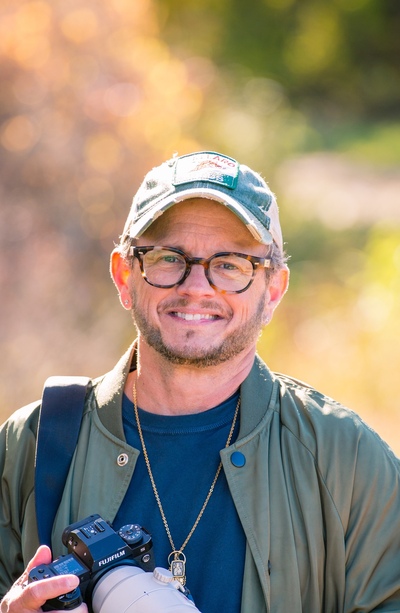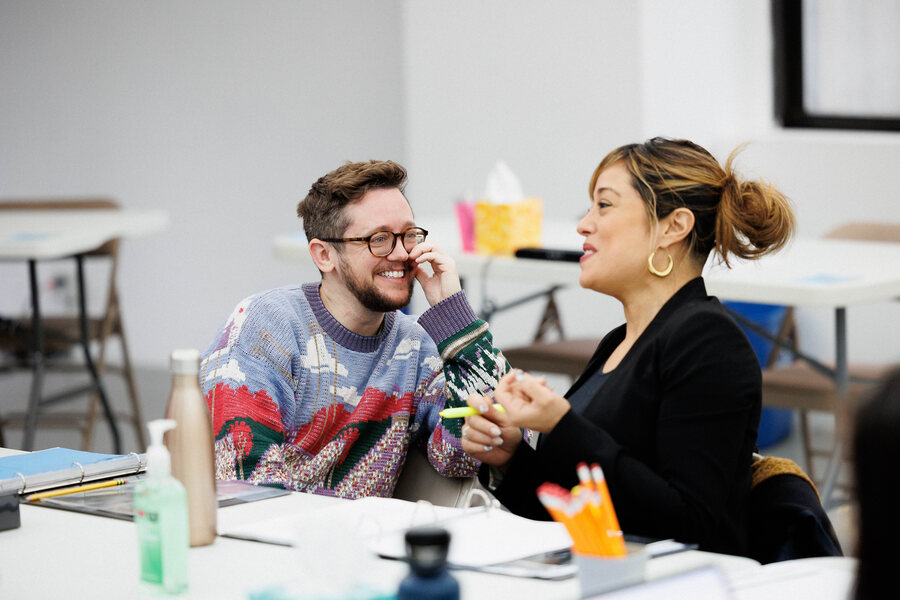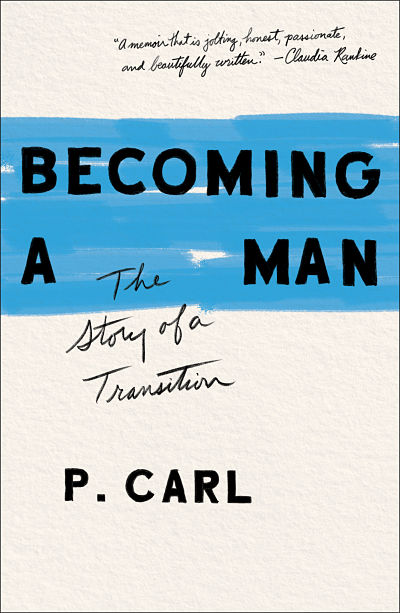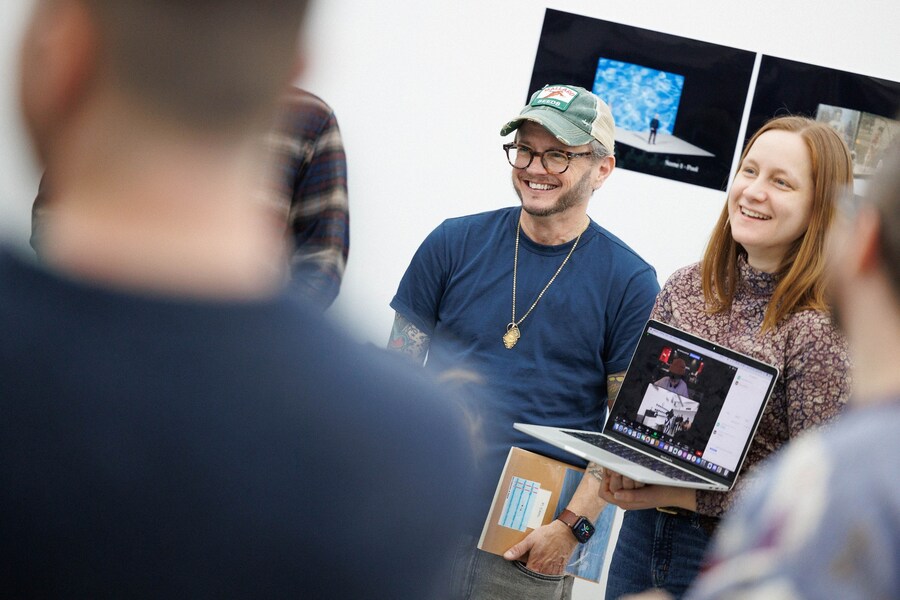“There are almost no transitions,” P. Carl said of his new play Becoming a Man, adapted from his 2020 memoir of the same name, at American Repertory Theater in Cambridge, Mass., Feb. 16-March 10. Carl was referring to the structure of the show, which he’s co-directing with ART artistic director Diane Paulus, and added, with a sorry-not-sorry chuckle, that the staging is “kind of like a fever dream—I’ve made the designers absolutely lose their minds.”
On another level, though, transition is both the central action and the theme of both the memoir and the play, as it traces Carl’s belated emergence as the masculine person he realized he always truly was, after nearly 50 years living as an increasingly traumatized woman. It’s perhaps fitting that the play should feel relatively fluid and liminal, given that Carl’s book is so bracingly frank about both the liberating and the complicating consequences of such a wrenching change, not only for himself but for his family and especially for his wife, Lynette D’Amico, a writer and editor who for 20 years believed she was married to a woman—a butch lesbian, admittedly, but still a queer woman—and had to learn to love a man. In the book and the play, Carl looks back on that period as “the best and worst year of my life.”
Carl also forthrightly faces the bittersweetness of becoming a white man in a time of right-wing backlash against people of color, gender diversity, and bodily autonomy. (We published an excerpt from his book that touched on some of this.) Though the play also addresses that context, it is in many ways a more straightforward love story than the book was. As Carl succinctly summarized the knot at the heart of the story: “Staying in the marriage was the most important part besides the transition, but I couldn’t do it without transitioning.”
Holding those two often conflicting priorities in some kind of equilibrium is a rich source of drama, and Carl knows drama, though this is in fact his first credit as a playwright. He worked in the theatre for decades as a dramaturg and producer at Playwrights’ Center, Steppenwolf Theatre Company, and Arena Stage, and consulted on works with such collaborators as Claudia Rankine, Jessica Blank and Erik Jensen, Melinda Lopez, Deborah Stein, and Suli Holum. In 2012, he co-founded HowlRound Theatre Commons, for which he contributed many essays, and he’s currently a distinguished artist-in-residence at Emerson College in Boston.
We spoke over the phone, which Carl prefers to Zoom. The following has been edited for concision and clarity.
ROB WEINERT-KENDT: I’m curious, at what point did Becoming a Man start to look or feel like a play to you? Did you have it in mind as you were writing the book, or was the book its own thing and thinking about it theatrically only came after it was done?
P. CARL: I did not think about it theatrically until it was public—or right before it was published. As I was writing, I had Diane Paulus read the book in proofs, and she loved it. We talked and I said, “I totally think I can make it a play,” so they commissioned me to do it. We were on a cool trajectory and had a reading of it, and then two days later, it was Covid. So four years went by. But Diane is just one of the best theatre minds I’ve ever been around, and having worked with her on The White Card with Claudia Rankine, I knew that I wanted to work with her again. I’ve been proven right in our process. It’s kind of mind-blowing to watch her work.
This may sound strange, but the book feels like it’s from a different time, both in terms of the discourse around trans rights, for better and worse, and because it feels like your thinking about your transition has changed a bit in the interim. Can you talk about adapting a work where the ground under it is shifting?

Two things I would say about that. One, it’s inevitable that I would change the piece; obviously it is not the book I would write now, just knowing what I know now that I couldn’t have known then. It’s hard to put aside what you know now and just adapt the book, if it’s your life. If it were an adaptation of somebody else’s book, it might be easier.
And yes, I do think the thought process has gone further in terms of my own understanding. I would say that a lot of what happens in the play is pretty true to what’s in the memoir, but there are scenes I wrote that are not in the memoir that make it clear that Lynette and I love each other. Like, that sentiment is in the memoir, but it’s not a scene. Also, I’ve just had some insights that ended up being really useful for the play, and I couldn’t help but bring those, especially given the distance between the book and the play.
One of the first things I noticed when casting was announced is that there’s a Carl character and there’s a Polly character. My mind partly went to the practical question of how you portray a transition, and what it would mean to have the same actor play the part all the way through, like Jeffrey Tambor in Transparent. Then I read the play and I see you have a lot of fun putting these two characters literally in dialogue with each other, and also making interesting choices about when Polly shows up and when Carl shows up and which is the “real” you at different points.
I always knew Polly would be in it. I always imagined two separate characters. Really, a lot of the play is Carl having these conversations in his head with Polly. I lived for 49 years as Polly, so when people talk about deadnaming, I completely respect that, but there was no deadnaming her, because she was everywhere, in the work I did, and also in a 20-year marriage. Like, are we gonna throw all our pictures away?
So I always knew she was gonna be in the play, and I always knew that the core of the play would be how Carl and Lynette came to some way of seeing what they were each experiencing, when in the moment of it happening all they could see was what they were losing. With Polly there are some cool moments where sometimes she’s scolding Carl, like, “I can’t believe you just said that,” and he’s acting like an adolescent boy. Or there’s a scene where she’s jealous that he has a trainer.
I feel like we all live with multiple truths and many consciousnesses. The idea of having a double consciousness that was really split was very true at the time I wrote the book, and to some degree has some bearing on how I live now, though now it’s different. It’s that whole conversation when you’re transitioning: What am I bringing with me? I really don’t know. Who is this guy I’m becoming? That’s kind of the battle for him.
I imagine it must be a surreal, out-of-body experience for anyone to watch someone play them onstage, but to watch people play two different parts of your life in two different bodies—I can’t even imagine.
It’s horrifying! And the worst part is, you know how rehearsals go: It’s the scene over, and over, and over. After the 20th time we have our fight over the asparagus, I’m like, I just can’t. My job has to be to stay focused on making a great play, and then have periodic breakdowns in the hotel afterward. In the room the job is not to distance myself from the emotions of it necessarily but to distance myself from any defensiveness about it. What’s been really fun about collaborating with Diane, and co-directing with her, is that she’ll have an instinct about what the emotional tenor is, and her instincts are really good, and then I’m able to actually go, well, it’s even more like this. Then we can take it to another level. If I work that way, it plays to the intellectual side of me that I am more comfortable with. But I don’t recommend writing a play about yourself and then co-directing it.

There’s a lot about the relationship between you and Lynette that feels quite universal and relatable.
I’ve had so many people that say that about the book, like, “Oh my God, this is a real relationship.” I remember thinking: The longer I’m with somebody, the easier it will get. No, it’s the opposite of that!
This is a question I had about the original book too, but to what extent is Lynette okay with all that you portray and retell here?
Actually, she has her own book of essays she’s written that she just finished, and we should be looking for a publisher soon. It’s really important to know that she actually edited the book; she’s a copy editor. So I had to make sure that she was okay with every sentence. I would not have put out anything that made her—I mean, it all makes us uncomfortable, but I wouldn’t have put in anything that she was opposed to.
I felt this with the book but I feel it even more with the play, which makes these debates into actual scenes, and so makes very personal many of the debates that have become so polarized in our culture—about trans rights, about gender affirming care, about lesbian feminists being pitted against trans men. Lynette and Carl even occasionally fight in those terms; he feels like her not being attracted to him means she doesn’t support his transition.
Right, he calls her a transphobe.
It is just so intense to watch a real couple work through this stuff, and to say things to each other that in the public discourse would be just radioactive.
I’ve been writing for a long time, and if you went and read all of my HowlRound pieces and other pieces that have been published, you’ll see that the thing that has always interested me is the way in which big topics live in that intimate space between people. I could write a really political play—and as Carl says to Nathan in the play, it is political, but that’s not what I’m feeling. It’s not political; it’s in my life. When people can feel something, they’re much more likely to change or take it in than when people are learning something. This could be a play that was educational, like, “This is what it’s like being trans.” But I think when you can really dig into the emotional center of relationships, then people can start to see the humanity and the similarities. That’s where I like to write to.
It takes some courage to write this way, I would think. You mentioned deadnaming, but that choice sort of stands in for a whole way that you’re talking about your own transness, and the fact, as you have Carl say at one point, that he doesn’t really feel being trans as a queer thing; he was just always a man. Not every trans man has that experience, but you do, and you articulate it.
Right, I know trans men who will say, “I’m really glad I was born a girl.” That’s not my experience. The thing about this play is that I don’t think a transmasculine play has ever been done on this scale, so everybody’s gonna be looking at it and thinking how they relate to it. My hope is that it’s both a very specific story but also that it can invite all kinds of people in, and there are places where they can see some version of themselves. I think trans people will relate to parts of it, and there will be other parts they’ll think of differently. The problem always is, when you only have a few things out there to represent a whole community, that there’s too much pressure on the thing. I’ve been working really hard to hear feedback from our trans cast. A 30-year-old trans guy and a 57-year-old trans guy might have some different thoughts. I’ve been trying to stay open to that. I just know that for me, I never looked at a picture of myself and saw me until I transitioned. That’s how I know that I was never me; I mean, I was there and I wasn’t there.
This is one of things that got me into birding. There are 11,000 species of birds, and there’s only one species of human. That’s weird, right? As birders, we’re parsing the smallest difference to tell one species from another, but with humans we’re like: male, female, Black, white, straight…If you look at different ecosystems, then you see that they’re actually much more complicated than ours.

In the excerpt from the book we published, you wrote about how the Brett Kavanaugh hearings triggered memories of the way abuse and harassment felt in your body when you lived as a woman, and how you still had access to those feelings in some way. But I was really struck by the conversation that Carl has with Nathan, another trans man in the play, where they realize there are limits to how much they ever understood being a woman, because they really weren’t women. That seems like a step beyond what the book was saying.
It’s definitely a step beyond. I wrote the book in the present tense, very much in the moment. That was intentional. I’ve been writing long enough to know that hindsight is one kind of writing, and in the moment is another kind of writing. You don’t want to be journaling, but you also don’t want to be archiving. What’s the place in between?
There’s this idea that trans people have these huge insights—they definitely have some insights. But as we say in the play, I know what it was to be treated like a woman, but what I figured out was that in the same way I feel so much more embodied now, for Lynette, her desire, that’s how she feels as a lesbian. It was then that I realized, no, I never actually knew what that was, because I never actually felt that. That helped me to really think about how for me being a trans guy was really about becoming myself, and seeing that in many ways Polly was kind of a performance, not a feeling. I don’t think she could access those feelings in the way that people who are comfortable walking around the world can.
There’s a moment where Carl says to Nathan, “I have always felt at home in masculinity, and I don’t feel queer.” And Nathan says, “You’re a trans man, that’s different from a man.” But Carl’s argument to him is basically, in his experience, he doesn’t feel that difference; he’s a man. There is a difference politically, but not in terms of what you feel inside.
I would say that in that moment of the transition, that is what I felt. If you ask me that now, you know, I’m 75 percent that. I mean, I’m the only trans faculty member at Emerson, for example, and I think it’s very significant when I’m teaching students; I think my trans identity has a major part in that, and I know that I’m embodying a kind of queerness, and I’m glad to. I want to. I feel it. It’s part of me. And then I can drive home to Rhode Island and work with some guy chopping up one of the trees that fell on my yard with a chainsaw. And they seem like two different people. Both things feel very natural to me in a way. In the time of writing the book, I was so struck by how much of what was happening wasn’t confusing; it was like, oh, yeah, this feels right.
But that’s a moment in the journey. I do think that some people really embrace all the ways they feel queer in a much more, I don’t know, diverse way. Like somebody who is non-binary—they’re living in another space in the world. For me, the part that’s truthful is that the masculine part of the world—whatever that means, and you can’t reduce that either, but if you had to pick one, that’s where I felt I belonged, always.
I think I can joke with you about this, Carl: Between the birding and the bourbon, you’re definitely more butch than I am.
Oh, I’m one of the more masculine people I know. It’s funny, we have these two trans guys in the play and neither of them are like that at all. Carl says, “I’m a guy’s guy,” and Nathan says, “What the fuck is that?”
Rob Weinert-Kendt (he/him) is the editor-in-chief of American Theatre.


